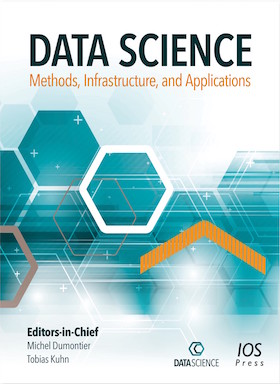Published Issues
- Inaugural issue: Volume 1, Issue 1-2
- 2019 issue: Volume 2, Issue 1-2
- First issue of 2020: Volume 3, Issue 1
- Second issue of 2020: Volume 3, Issue 2
- First issue of 2021: Volume 4, Issue 1
- Second issue of 2021: Volume 4, Issue 2
- First issue of 2022: Volume 5, Issue 1
- Second issue of 2022: Volume 5, Issue 2
- Combined issue of 2023: Volume 6, Issue 1-2
- First Issue of 2024: Volume 7, Issue 1
- Second Issue of 2024: Volume 7, Issue 2
- First Issue of 2025: Volume 8, Issue 1
- Articles to be included in next issue
Open Calls
You can find our open calls here.
Aims and Scope
|
|
Data Science is an interdisciplinary journal that addresses the development that data has become a crucial factor for a large number and variety of scientific fields. This journal covers aspects around scientific data over the whole range from data creation, mining, discovery, curation, modeling, processing, and management to analysis, prediction, visualization, user interaction, communication, sharing, and re-use. We are interested in general methods and concepts, as well as specific tools, infrastructures, and applications. The ultimate goal is to unleash the power of scientific data to deepen our understanding of physical, biological, and digital systems, gain insight into human social and economic behaviour, and design new solutions for the future. The rising importance of scientific data, both big and small, brings with it a wealth of challenges to combine structured, but often siloed data with messy, incomplete, and unstructured data from text, audio, visual content such as sensor and weblog data. New methods to extract, transport, pool, refine, store, analyze, and visualize data are needed to unleash their power while simultaneously making tools and workflows easier to use by the public at large. The journal invites contributions ranging from theoretical and foundational research, platforms, methods, applications, and tools in all areas. We welcome papers which add a social, geographical, and temporal dimension to Data Science research, as well as application-oriented papers that prepare and use data in discovery research. |
Core Topics
This journal focuses on methods, infrastructure, and applications around the following core topics:
- scientific data mining, machine learning from datasets, and Big Data analytics
- scientific data management, network analysis, and knowledge discovery
- scholarly communication and (semantic) publishing
- research data publication, indexing, quality, and discovery
- data wrangling, integration, and provenance of scientific data
- trend analysis, prediction, and visualization of research topics
- crowdsourcing and collaboration in science
- corroboration, validation, trust, and reproducibility of scientific results
- scalable computing, analysis, and learning for Data Science
- scientific web services and executable workflows
- scientific analytics, intelligence, and real time decision making
- process mining
- socio-technical systems
- social impacts of Data Science
- legal and ethical considerations of Data Science
Editors-in-Chief
- Michel Dumontier, Maastricht University
- Tobias Kuhn, VU University Amsterdam
Features
Open Access
The journal is open access. For papers submitted from 1 September 2024 onwards, an introductory article processing charge (APC) of US $800, discounted from the full rate of US $1,600, is available for a limited time. See here for possibilities to fund these APCs.
Speedy Reviewing
We are committed to avoid wasting time during the reviewing period. To achieve that, we ask reviewers to complete their reviews within 10 days.
Open and Attributed Reviews
Reviews are non-anonymous by default (but reviewers can request to stay anonymous). All reviews are made openly available under CC-BY licenses after a decision has been made for the submission (independent of whether the decision was accept or reject). In addition to solicited reviews, everybody is welcome to submit additional reviews and comments for papers that are under review. Editors and non-anonymous reviewers will be mentioned in the published articles.
Pre-Prints
All submitted papers are made available as pre-prints before the reviewing starts, so reviewers and everybody else are free to not only read but also share submitted papers. Pre-prints will remain available after reviewing, independent of whether the paper was accepted or rejected for publication.
Data Standards
We want to promote an environment where annotated data is produced and shared with the wider research community. We therefore require authors to ensure that any data used or produced in their study are represented with community-based data formats and metadata standards. These data should furthermore be made openly available and freely reusable, unless privacy concerns apply.
Semantic Publishing with Nanopublications
We encourage authors to make their findings machine-interpretable by submitting nanopublications together with their manuscripts.
HTML
We encourage authors to submit their papers in HTML (but we accept Word and LaTeX submissions too).
ORCID
Data Science is working with ORCID to collect iDs for all authors, co-authors, editorial board members, and reviewers and connect them to the information about your research activities stored in our systems.
Having an ORCID iD:
- distinguishes you and ensures your research outputs and activities are correctly
attributed to you - reliably and easily connects you with your contributions and affiliations
- reduces form-filling (enter data once, re-use it often)
- improves recognition and discoverability for you and your research outputs
- is interoperable (works with many institutions, funders, and publishers)
- is persistent (enduring)
It is also often a requirement when you submit journal articles or grant applications.
Learn more about ORCID at Welcome to ORCID https://orcid.org/content/help.
Indexation
Data Science is covered in ACM Guide to Computing Literature, DBLP, Directory of Open Access Journals, Google Scholar, Scopus.
Links
- Official page by publisher
- Our Twitter account
- Data Science newsletter signup
- Do you have a suggestion or comment? Let us know via our issue tracker
 Log In with ORCID
Log In with ORCID
